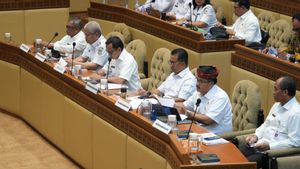JAKARTA - The Central Statistics Agency (BPS) through the Directorate of Analysis and Statistics Development reported on the traces of children free or childfree in Indonesia. Childfree refers to adult individuals or couples who choose not to have children either biologically or adopted.
In a report uploaded in DATAin entitled Searching Childfree Traces in Indonesia' in the 2023 edition, it is stated that 71,000 women in Indonesia choose to be childfree. Estimated this figure was obtained in Indonesian women aged 15 to 49 years.
The current prevalence of childfree women living in Indonesia is around 8%. SUSENAS 2022 estimates that this figure is against 15-49-year-old women who have been married but have never given birth to children alive and do not use KB equipment and get 71 thousand of them do not want to have children, "wrote the BPS report, on Tuesday, November 12, 2024.
BACA JUGA:
The decision for childfree was not related to fertilization health, but purely only by choice. The data on Indonesian women who choose to be childfree increases every year.
Through data processed by SUSENAS in 2019, the percentage figure is 7.0, then in 2020 it decreases 6.3, in 2021 it will again increase to 6.5, and in 2022 the percentage figure will reach 8.2.
BPS noted that from several journals created in 2022, women who pursue higher education often delay and even do not want to have children. The level of education greatly affects job opportunities, which will then determine a person's economic status.
So the childfree decision in Indonesia is not only influenced by the good level of education, but is also motivated by economic difficulties. The 2022 SUSENAS data, around 57 percent of childfree women are not actively involved in economic activities, so it is undeniable that the economy is one of the determining factors in life without children.
Through this data, it is also explained that the percentage of women who do not want to have children in Java is almost 9 percent in 2022. The highest is in DKI Jakarta, followed by West Java.
BPS said that seeing the percentage of women in Indonesia choosing childfree will most likely increase in the following year. This can make Indonesia lose a certain generation segment in the pyramid of the population if the trend continues.
In the short term, childfree women can be said to ease the government's budget burden because education and health subsidies for children are reduced. However, in the long term, the welfare of childfree women aged will potentially become the responsibility of the state.
The English, Chinese, Japanese, Arabic, and French versions are automatically generated by the AI. So there may still be inaccuracies in translating, please always see Indonesian as our main language. (system supported by DigitalSiber.id)













